Why Black Faith Leaders Are Crucial in the Fight for Environmental Justice
May 20, 2022
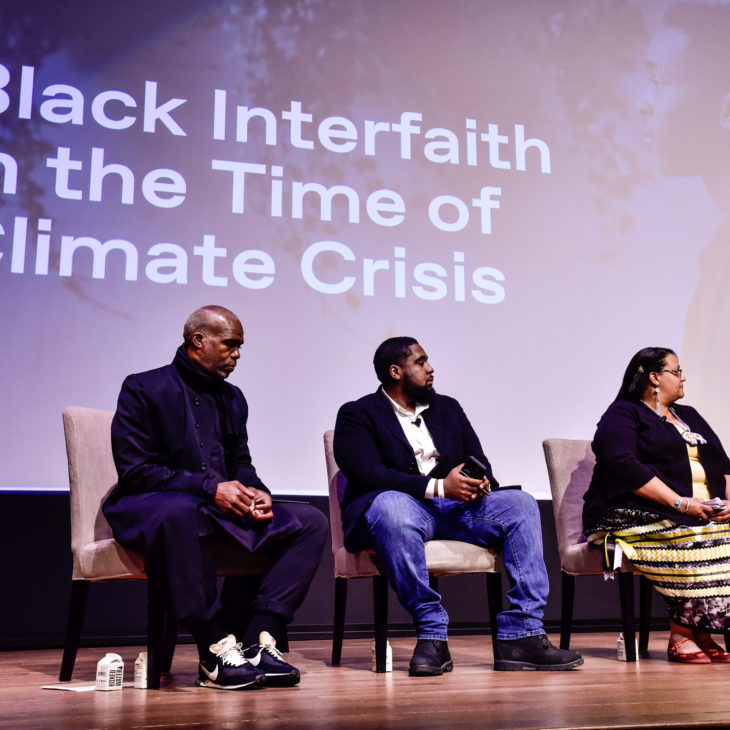
On Tuesday, May 17, Interfaith America and The Center for Earth Ethics hosted Black Interfaith in the Time of Climate Crisis, a conversation about the crucial role of Black faith leaders and spiritual traditions in the environmental justice movement and the unique challenges climate change poses to Black communities.
Former Vice President Al Gore and author and consultant Ibrahim Abdul-Matin offered keynote addresses at the event at the Smithsonian National Museum of African American History and Culture in Washington, D.C.
The Rev. Alexis Vaughan of Interfaith America lead a panel discussion with Karenna Gore of The Center for Earth Ethics; William J. Barber III of The Climate Reality Project; Pamela Ayo Yetunde, author of “Black and Buddhist: What Buddhism Can Teach Us About Race, Resilience, Transformation and Freedom“; and Crystal Cavalier-Keck, co-founder of Seven Directions of Service, a citizen of the Occaneechi Band of the Saponi Nation in Burlington, North Carolina, and Chair of the Environmental Justice Committee for the NAACP.
Here are some highlights from the conversation:
Fred Davie – “It’s really important to for us to center and understand Black interfaith cooperation as a phenomenon unto itself. It started with Black people, people of African descent on the shores in the 1600s, as our friend and colleague Dr. Yolanda Pierce reminded us, that we did not come to the shores as empty vessels. We came with traditional African religions, we came with Islam. And all of that had an impact on how we evolved and developed as a people.
The nation has not spent a lot of time focused on that history and its influence and impact. And part of the genius of this work, I think, is the fact that we’re doing that now. Not only just to look at history, and understand that history, but to see how it’s working and playing out now in our current realities, to see how it intersects with the many different aspects of American life and the life of the world. And then to share how we can continue to resource this experience of Black Interfaith cooperation and can continue to resource the nation, as we move forward and find our way in these very troubled times. One area where that is really important is in the area of the climate crisis. The Black presence around and in this issue has not been as prominent And as significant as it perhaps could have been. we’re seeking to change that. And we’re particularly seeking to change it not just from one faith perspective, but from the many faith perspectives that make up the Black community in America.”
Crystal Cavalier-Keck – “For the Mountain Valley Pipeline Southgate Extension Water Walk, we all started out with an interfaith prayer, because we believe that everybody prays to whoever you want to pray to, or whatever. But if we do it in unison, we can just be better. And then once people feel comfortable and trust each other, it is a lot easier to organize in our communities, especially when it comes around the Earth, environmental degradation and how we all have to stand up and fight back.”
Alexis Vaughan – “Something that was alluded to in both keynotes … is this unique moment that we’re in, it’s a moment of greater attention being given to Black leadership, and Black-centered storytelling, perhaps inspired by the 1619 Project, centering Black perspectives in the telling of American history. And one thing that that uncovered is just how deeply intersectional and diverse Black life is. For example, some folks might assume that Black people of faith are new to interfaith cooperation, but we’ve been out here. Interfaith is who we’ve been all along as a people of diaspora and largely disenfranchised all over the world.”
William J. Barber III – “James Palmer, Jr., the founder of CORE, the Congress for Racial Equity, … stated in the height of the civil rights movement, that whatever we do in civil rights would be of no meaning, if we did not save the environment, because we would all have the equality of extinction. Drawing these connections, and it makes sense, because the presence of the Black faith community, in the inaugural stages of the environmental justice movement, make us realize that faith traditions had and continue to be some of our greatest bastions of activism. Their engagement literally laid the foundation and the skeletal framework for the activism around climate justice we see today.”
Share
Related Articles
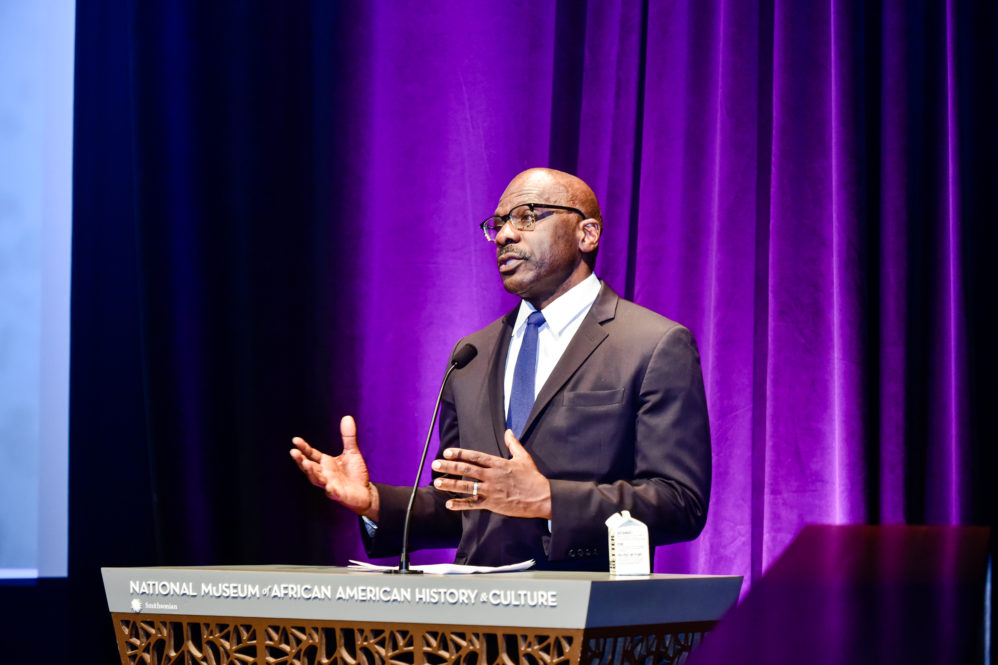
The Rev. Fred Davie. Photo ©John Drew
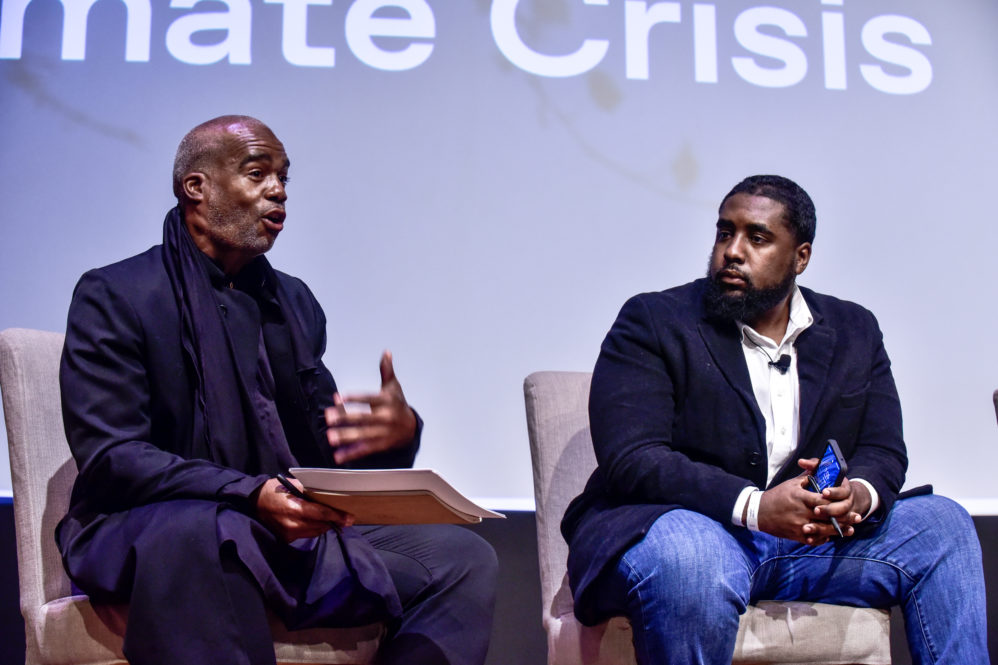
ibrahim abdul-matin (l) and William J. Barber III in panel discussion. Photo ©John Drew
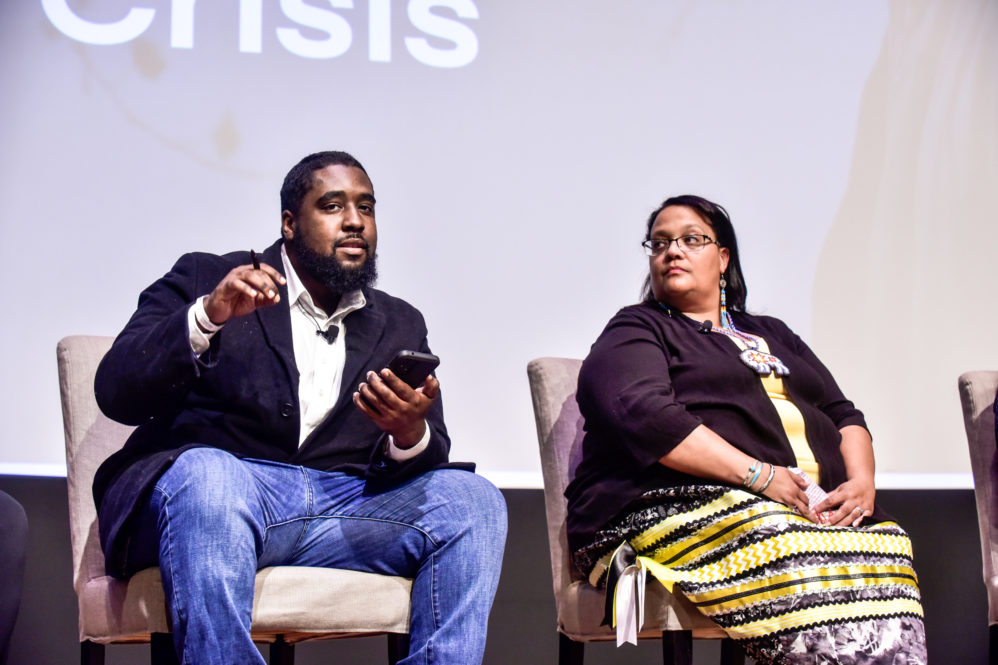
William J. Barber III (l) and Crystal Cavalier-Keck. Photo ©John Drew
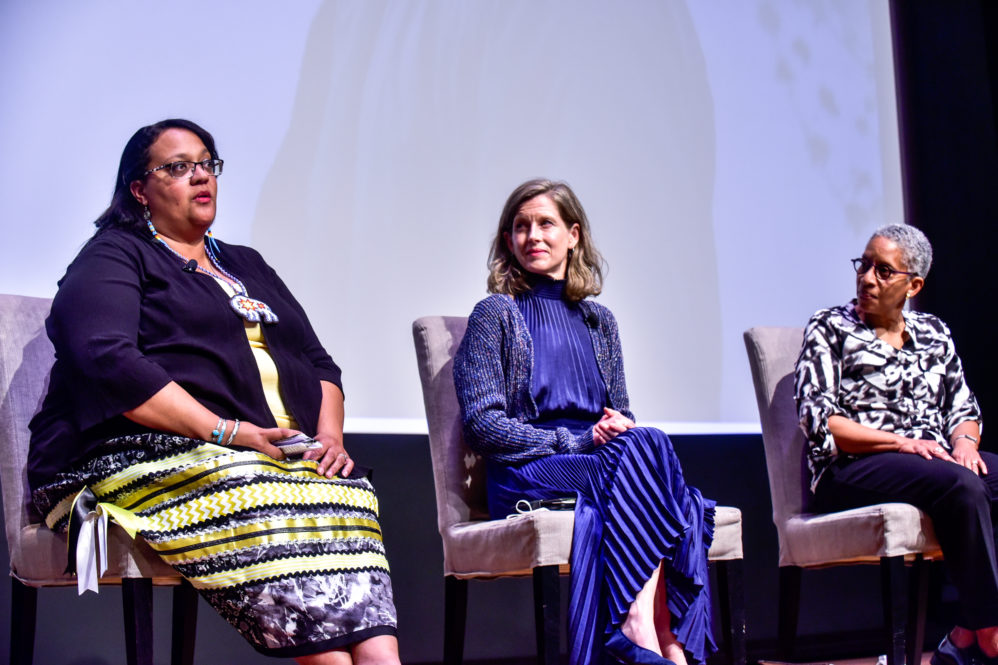
Crystal Cavalier-Keck, Karenna Gore, and Pamela Ayo Yetunde (left to right) in panel discussion. Photo ©John Drew
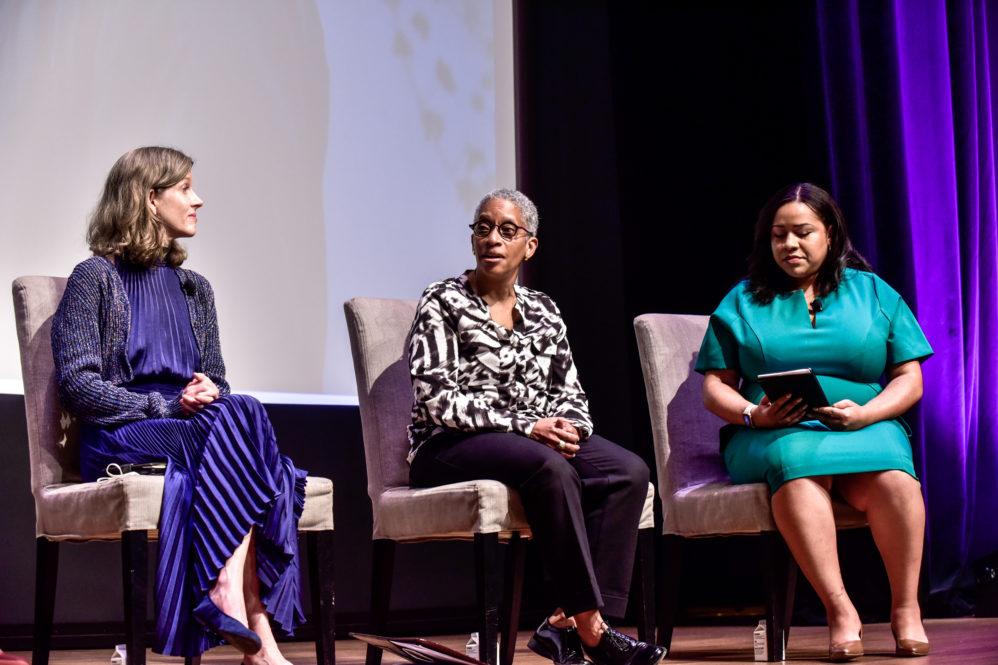
Karenna Gore, Pamela Ayo Yetunde, and the Rev. Alexis Vaughan (left to right) in panel discussion for “Black Interfaith in the Time of Climate Crisis,” May 2022. Photo ©John Drew
Karenna Gore – “We can’t just act at the level of effect; we need to be at the level of cause. I think faith communities can look at that root level of cause … and heal it. There are three roles that faith, communities can play – pastoral, prophetic, and practical. And to start with … prophetic, which is telling the truth. Pastoral, obviously, we’re dealing with many emotions, including denial, which a lot of people use to block the grief and the pain. We need pastoral care for that and taking people through extreme weather events and things that are coming in communities. And then practical, so things like greening houses of worship and dealing with finances, organizing, and so on. These are roles that faith communities can play.”
Pamela Ayo Yetunde – “[This Buddhist meditation is] like an invitation for me to decenter myself as a human being, and center other aspects in nature and to be able to feel the resonance, the vibration, whatever we can do to deepen our empathy towards other life forms, is something that we need to do.”
“We need to talk across our religious traditions, especially with the rise of Christian nationalism, which has a destructive impact on much of life, and our planet, we need to be able to have respectful conversations about these things with people who are different than we are, in our views.”
Ibrahim Abdul-Matin – “When Moses spoke, speaking with God, when God told Moses to go to Pharaoh, and we have consistently, as Black Americans and people of faith, we have been asked to go to Pharaoh time and time again. We’ve been in the house of Pharaoh. We’ve literally helped build this house just like Moses helped build the house of Pharaoh. And time and time again, we are forced to go and speak truth to that power. And hold it accountable. It is exhausting … So we have work to do as people of faith.”
“Put Black and brown people at the center of deciding how the natural world around them should be used in a way that does not hurt, maim, kill, or destroy. [George Washington Carver] is the godfather of how to use science to the best of our ability, instead of using science to make weapons, using science to understand the most because science at that level is literally a form of worship.”
“I’m asking every single Black person, every single person of color, every single person in this room, every single person is listening to this livestream. This is a message from the Ancient Future. This is a message when we are at this crossroads. We’re looking into the past and seeing those roads that we could have taken. And we’re going to remember those roads. And we are at this moment again, but we can make the right decision. We can just say no to the whisperings, we can tell the evil spirits to get out of this room. We can say this is my brother, this is my sister. You might be Buddhist. You might be Christian, you might not have a faith. But we are united, and we must be united if we’re going to figure this out. If we are going to go to Pharaoh, we must bring back this message from the ancient future. We must see the future that’s in front of us, where we’re going to be shocked that people used to use water for toilets. What was that? Y’all use clean water to put your waste in? Right? They’re going to be shocked that people were hungry. People didn’t have homes. You let people go without love.”
Al Gore – “In searching for the solutions to the twin crises of climate and racial justice, we must work to build bridges of understanding with those who are suffering the worst impacts. Here, leaders of all faith traditions can play an incredibly important role in bringing attention to and support for these communities, and indeed they’ve been doing so already for decades. Because of an introduction by Karenna, I’m blessed to work with Rev. William Barber II, and we’re privileged to hear from William Barber III later on. And we’ve worked to shine a light on environmental and climate injustices and connect the environmental and faith communities. Rev. Barber has done vital work to not only revitalize the Poor People’s Campaign, but to expand on Dr. King’s initial list of three interlocking evils that he campaigned against 50 years ago – racism, poverty and militarism – by adding a new focus on the fourth, and that is ecological devastation.”
Resources and inspiration from a range of traditions and ideas for action can be found in the Black Interfaith in the Time of Climate Crisis Toolkit. From a Catholic community in Louisiana fighting to keep chemical plants out of their neighborhood, to faith leaders in Charlotte demanding divestment in fossil fuels, to a transformational network of church-based gardens, Black faith communities across the U.S. are leading efforts to respond to the climate crisis.
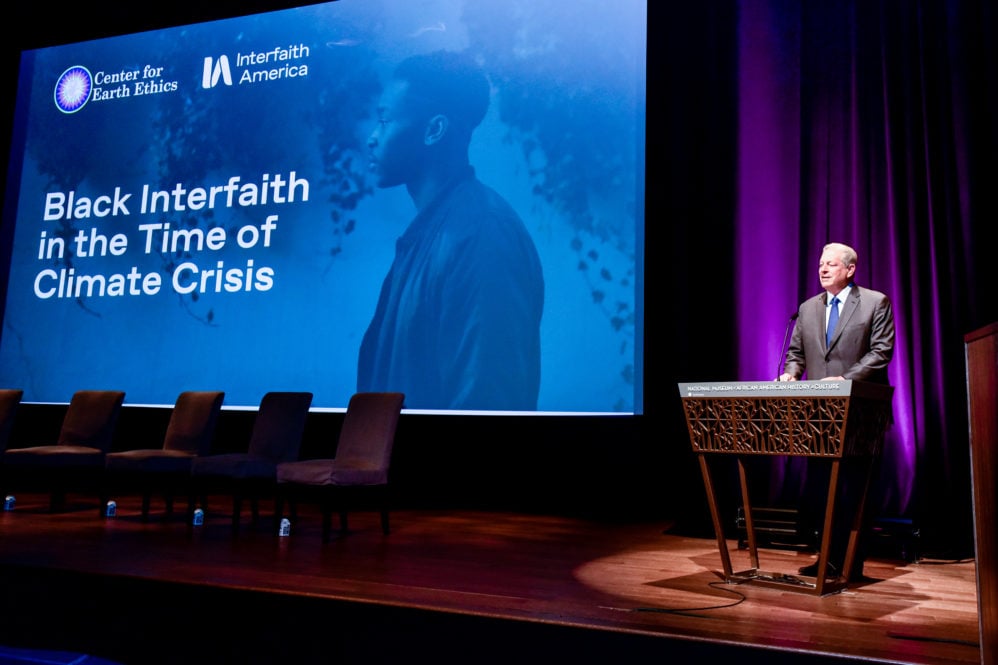
Former VP Al Gore. Photo ©John Drew



